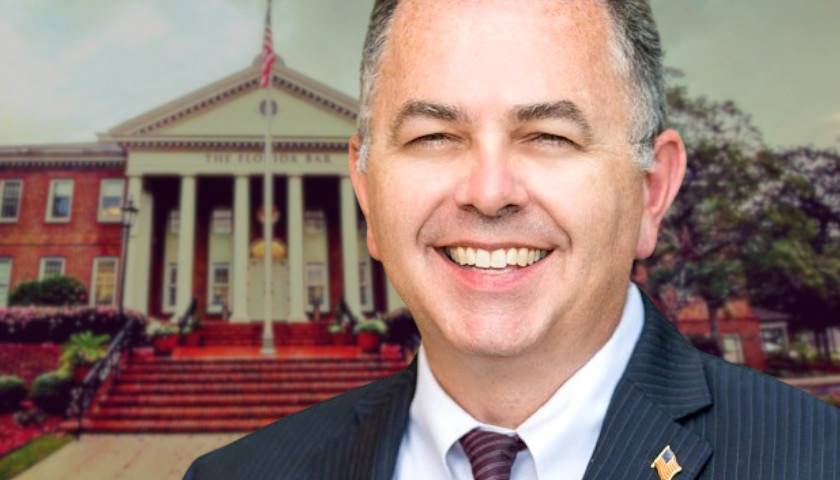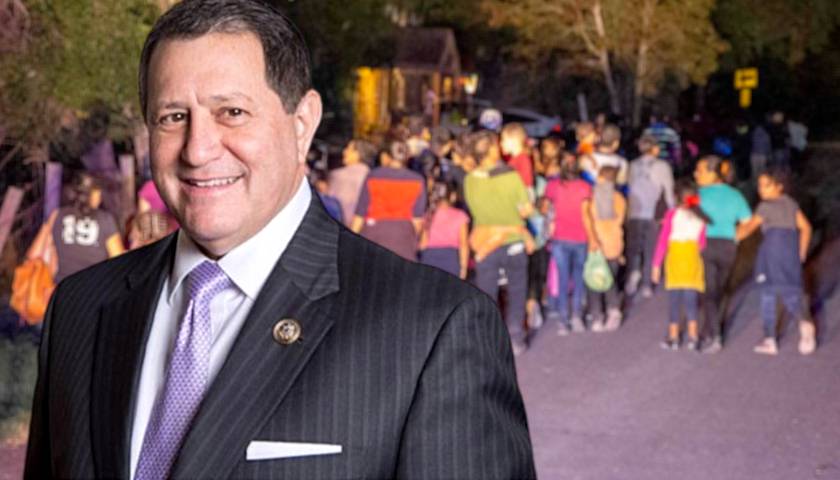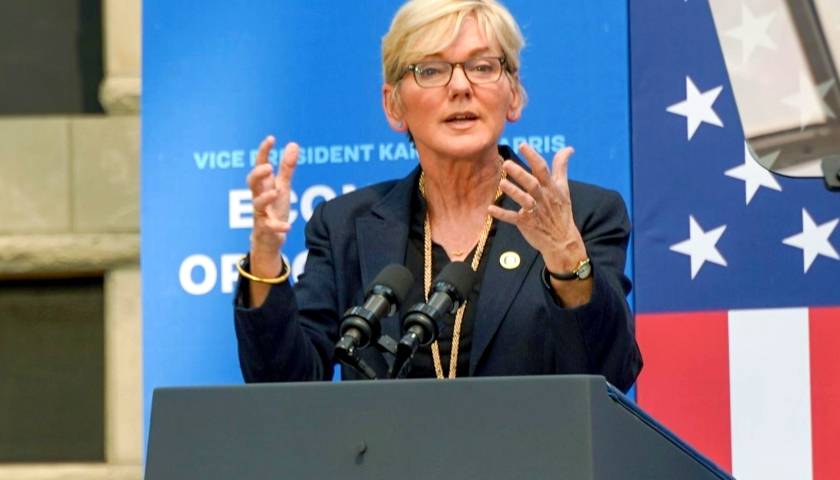A referee judge for the Florida State Bar recommended suspending decorated Gulf War veteran Chris Crowley’s law license for 60 days over his criticism of an opponent he ran against for the Office of the State Attorney in Florida’s 20th Judicial Circuit.
During the 2018 race, Crowley referred to Amira D. Fox, who eventually won, as “corrupt” and “swampy” and observed that she had “close family ties to the PLO terrorist organization.” The Florida Bar had requested a 91-day suspension for allegedly violating the bar’s ethics rule prohibiting criticism of judges, election officials, and candidates running for office.
Crowley’s attorney, Scott Tozian, warned during his closing argument that the Florida Bar assisted with the “thought police” and noted that this was the first free speech bar disciplinary case of its kind involving partisan political speech. “This is the first case anywhere, I would submit to you, since the bar not only failed to bring you a Florida Bar case talking about partisan political speech, but for many of the other 49 jurisdictions in the United States,” he said.
He added that the original referee, 12th Judicial Circuit Judge Maria Ruhl, found, “The parties in this matter have not presented any case in Florida that specifically considers the political speech of lawyers during a nonjudicial campaign.”
The hearing, held on February 28-29, resulted in a 319-page transcript. Crowley, who served in Kuwait and was a Lieutenant Colonel in the U.S. Army Reserve for years, had never been disciplined in his 24 years of practice.
Crowley (pictured above) brought witnesses he knew to testify about his character. Sandy Modell, who runs a hedge fund and met Crowley in 2016, discussed how his son was killed by an assailant, and he talked to Crowley about Fox refusing to prosecute the man.
Florida Bar Counsel Lindsey Guinand objected to some of Modell’s statements, prompting Tozian to respond justifying the testimony, “[I] was one of the situations that I think lent to Mr. Crowley describing Amira Fox as being corrupt and swampy.”
He said one of the Florida Bar’s exhibits was a Facebook post Crowley had made citing Modell’s book he wrote about his son’s death. Tozian said Modell did not believe the assailant qualified as “standing his ground” under Florida’s self-defense law.
Tozian said Crowley agreed with Modell and cited two Nevada Bar disciplinary cases that found that an attorney’s opinion can’t be the basis for an alleged rule violation. He said, “It almost strikes me as thought police.”
Twelfth Judicial Circuit Court Judge Gilbert Smith Jr. overruled Guinand’s objection and allowed Modell to resume some limited testimony.
Modell said a third party working for Fox, Ralph Singer, proceeded to work with him to remedy the lack of prosecution. He said that to prosecute the assailant; Singer relayed that Fox “wanted information about Chris Crowley, she wanted information about the campaign, she wanted a guarantee from me not to contact Crowley anymore, she wanted a guarantee that I wouldn’t support his candidacy if he ran against her again. And then she wanted a copy of an email that I was supposed to write to him severing our relationship. And in exchange for those things, presumably, I was going to get an indictment in my son’s murder case.”
Modell said all that information is in his book “Murder and Corruption in Florida.” He said the book “talks about Amira’s background and some of the things that I believe were corrupt in private practice and some of the things I believe she’s done in the State Attorney’s office, both as Chief Deputy and then subsequently State Attorney that I believe are corrupt.”
He said, “She was mad at me, and she’s privately confided she won’t file the case; it has nothing to do with the merits of the case. She was mad at me for putting up a billboard against her candidacy.”
He said he spoke with employees at Fox’s office off the record who “shared my belief it was corrupt; that the fact that Amira was campaigning on State time and did not want to be bothered with a big case while she was campaigning for the State Attorney’s office.”
Crowley’s team played a video of him serving in Kuwait and telling viewers about deployment. He took the witness stand, and Tozian asked him about his career. Crowley received the “Elite Government Attorney” award from Florida Trend Magazine in 2018 and possibly other times, he said. In the Army, he was promoted to Captain from First Lieutenant and awarded an Achievement Medal for organizing a unit-wide road march.
He was awarded an Army Accommodation Medal while serving in Kuwait and a second for reserve duty. He received a Meritorious Service Medal while working on or with separation boards in the 416th Theater Engineering Command in Illinois and the same award a year later for similar work. He received a third one while serving in the Army Reserve Medical Command in Pinellas. He was awarded a Joint Service Commendation for his service at Guantanamo Bay.
Crowley is currently a prosecutor for ICE. He said he would likely lose his job if his license was suspended for more than 90 days.
Crowley discussed a mailer that a PAC sent out to benefit Fox that “ma[de] it look like I was a convicted criminal. It was very deceptive. And it came out right in the primary, I want to say like 72 hours after I was arrested. It went to every single registered Republican in the five-county circuit.”
Crowley explained the circumstances leading up to his arrest.
“I went to a small restaurant in Buckingham, Florida, and two ladies put a raffle on for me, and it was $600. And I brought it back to my office, never put it in my campaign account, and I emailed up to Tallahassee saying can I accept this? And when they got back to me the following Monday, I gave it back to them and they gave it to charity.” The charges were dismissed after he performed 20 hours of community service.
Crowley’s attorney said, “I intend to argue at the conclusion of the case that this grievance was politically motivated by Mr. Russell on behalf of his hand-picked successor, Amira Fox. … What happened here was clearly politically motivated. It’s, to me, a raffle where you take money temporarily and find out you can’t take it and you give it back and they charge you with a crime right before a primary?”
He added, “I’m arguing that this is a selective prosecution, that they ignored the complaints about Larry Justham and things that the State Attorney’s office was doing to benefit Amira Fox, and yet went after Mr. Crowley hammer and tong for various things.”
Crowley said more information had come out since earlier proceedings against him. He said he filed a bar complaint against Larry Justham, “then the Chief of Felony for the State Attorney’s office.” Crowley said Justham, who was a “big political supporter of Amira Fox,” “was constantly on Facebook during work hours, attacking me all the time. A lot of disparaging comments about me constantly, I think he called me Creepy Crowley frequently.”
Crowley said he also filed a bar complaint against “L. Spencer Roach, he was an employee for Amira Fox as an Assistant State Attorney for a year or two.” According to Crowley, Roach sent a robocall to hundreds or thousands of homes, stating that Crowley “funded my campaign by illegal gambling proceeds” and was a criminal. Crowley has never been convicted of a crime. Guinand objected to entering the robocall into evidence, and the judge sustained it.
He also filed a bar complaint against Fox. He said that “several criminal defense attorneys told me about a serial rapist, Mr. Choudhury, who got one year in the county jail, a below-guideline sentence for no reason except it looks like his attorney was connected to Ms. Fox, made over $50,000 in contributions to her campaign, Mr. Sawyer Smith.”
Guinand objected to discussing the complaint, said it was irrelevant, and the judge sustained it. Tozian pointed out that Fox also previously worked for the firm that made the contributions, but the judge did not make any objections.
Seven more friends or colleagues of Crowley testified to his character. Joseph Sansone, a psychotherapist and adjunct professor who has known Crowley since 2011, said, “Crowley would never say something that he did not believe to be true or have a reasonable reason to believe it would be true.”
Scott Jeffcoat, an attorney who served in the Army JAGS Corp and who has known Crowley since 2008, said Crowley was “honest” and the Army “wouldn’t have bumped him up to head of Military Justice” if his performance as a lawyer was lacking.
Elroy Schipper, who served in the Army and who met Crowley in 2003 when he was deployed with Crowley to Kuwait, said about him, “He was an outstanding citizen, outstanding soldier, and a heck of a good judicial person.”
Colonel Ann Brophy, who handles legal matters for the Army and met Crowley in 2012, said Crowley conducted his legal work for the Army “honorably.”
Rachel Lazorik, who retired from the Florida State Attorney’s Office where she worked closely with Crowley, said he was “extremely diligent,” “precise,” “[v]ery dedicated, very devoted,” got along with others in the courtroom “excellent[ly],” and was “very well-liked.”
She said, “I’m fortunate to have known him. He’s been a friend for over 20 years.” She discussed how Crowley had done kind things for friends and family members in need, including herself.
Staff Sergeant Mark Reardon, who works with the Army chaplain, said he worked with Crowley at Guantanamo Bay in 2021-22. Reardon said Crowley helped soldiers deal with potential discipline coming down, “this would be stuff that he would do just out of, I guess the kindness of his heart, I mean, you know, ’cause he truly cared about the soldier.”
He said, “He was always selfless and his character was unquestionable.”
Daniel Lynch, a former client of Crowley who met him several years ago, testified, “[F]rom the first day I met him it seemed like I knew him for quite a time, like he was a friend. He was very easy to get along with and talk to.”
On the second day of the hearing, the attorneys gave closing arguments. Guinand said during her visit that there were aggravating circumstances present. One was the “selfish nature of his actions.” A second one, she said, was “refusal to acknowledge the wrongful nature of the conduct.” A third one was “substantial experience in the practice of law.”
When it was Tozian’s turn, he cited a bar disciplinary case from Nevada that analyzed Rule 8.2(a) of the Rules of Professional Ethics. He said the court held that “No matter the offensive or unkind nature of an attorney’s statement, it’s limited to statements of fact, as opposed to opinion, because only statements of fact be true or false.”
“It’s also like the bar wants to be the thought police,” Tozian said. “You can’t think this about Amira Fox, or you’ll never be a lawyer again.” He said the aggravating factor for substantial experience in the practice of law didn’t apply since the first referee judge, Ruhl, “didn’t find there was a violation of that ’cause it really isn’t the practice of law.”
Tozian distinguished other cases in which attorneys were disciplined with a 91-day suspension for making statements about judges, pointing out that their statements were false and that the courts allow far less freedom regarding speech in judicial races. He pointed out some similar cases in which attorneys merely received public reprimands.
Tozian said the Florida Bar uses a much stricter standard than the 11th Circuit Court of Appeals, which Florida is a part of, regarding free speech during political campaigns. He quoted from one of the circuit court’s rulings (but didn’t mention the name of the case), “[The] proper test to be applied to determine constitutionality of restrictions on core political speech is strict scrutiny. Under strict scrutiny analysis, the government has the burden of proving that the restriction is narrowly tailored to serve a compelling state interest.” The court went on, he said, and held that restrictions on speech during campaigns must be “limited to statements that are made with knowledge of falsity or with reckless disregard as to whether the statement is false — i.e., an actual malice standard.”
He pointed out the hypocrisy, “And I think you also have to consider what, you know, this outrage over what Mr. Crowley did is a little bit hard to take, when you consider that Amira Fox’s campaign labeled Chris Crowley as a criminal, saying that the State Attorney needs to put criminals behind bars and not be behind bars.”
He added that “the bar is not supposed to pursue personal vendettas” for complainants.
Smith issued his ruling at the end of the hearing. He said attorneys do not have the same free speech rights as non-attorneys running for political office. “So, you know, running for office as a lawyer for a position that’s a legal position is a lot different than, you know, someone that’s not an attorney running for an office, an elected office.”
An attorney in Florida with knowledge of the case, who preferred not to be identified, told The Arizona Sun Times that this ruling “created a new unpublished rule/restriction on Florida attorneys and political speech.”
That attorney said there has been almost no media coverage of the case since the Florida Bar doesn’t want any, refusing to answer questions from the media and refusing to broadcast the disciplinary hearing by Zoom. The California Bar disciplinary trial against Donald Trump’s former attorney and constitutional legal scholar, John Eastman, was broadcast over Zoom in California, and the Washington D.C. Bar disciplinary trial against Trump’s former DOJ appointee, Jeffrey Clark, was also broadcast over Zoom.
The Sun Times sent a list of several questions to Florida State Bar President Scott Westheimer. A spokesperson for the Florida Bar briefly responded, but the person did not say why observers could not watch the hearings over Zoom; instead, they were required to attend them in person. “We refer you to the public filings for the Bar’s position on the case. The disciplinary hearings were held via zoom unless Mr. Crowley asked for them to be in person. All proceedings were open to the public.”
It will be up to the Florida State Supreme Court next to rule on the recommended 60-day suspension.
– – –
Rachel Alexander is a reporter at The Arizona Sun Times and The Star News Network. Follow Rachel on Twitter / X. Email tips to [email protected].
Photo “Chris Crowley” by Chris Crowley, Conservative Republican. Background Photo “Florida Bar Building” by The Florida Bar.





